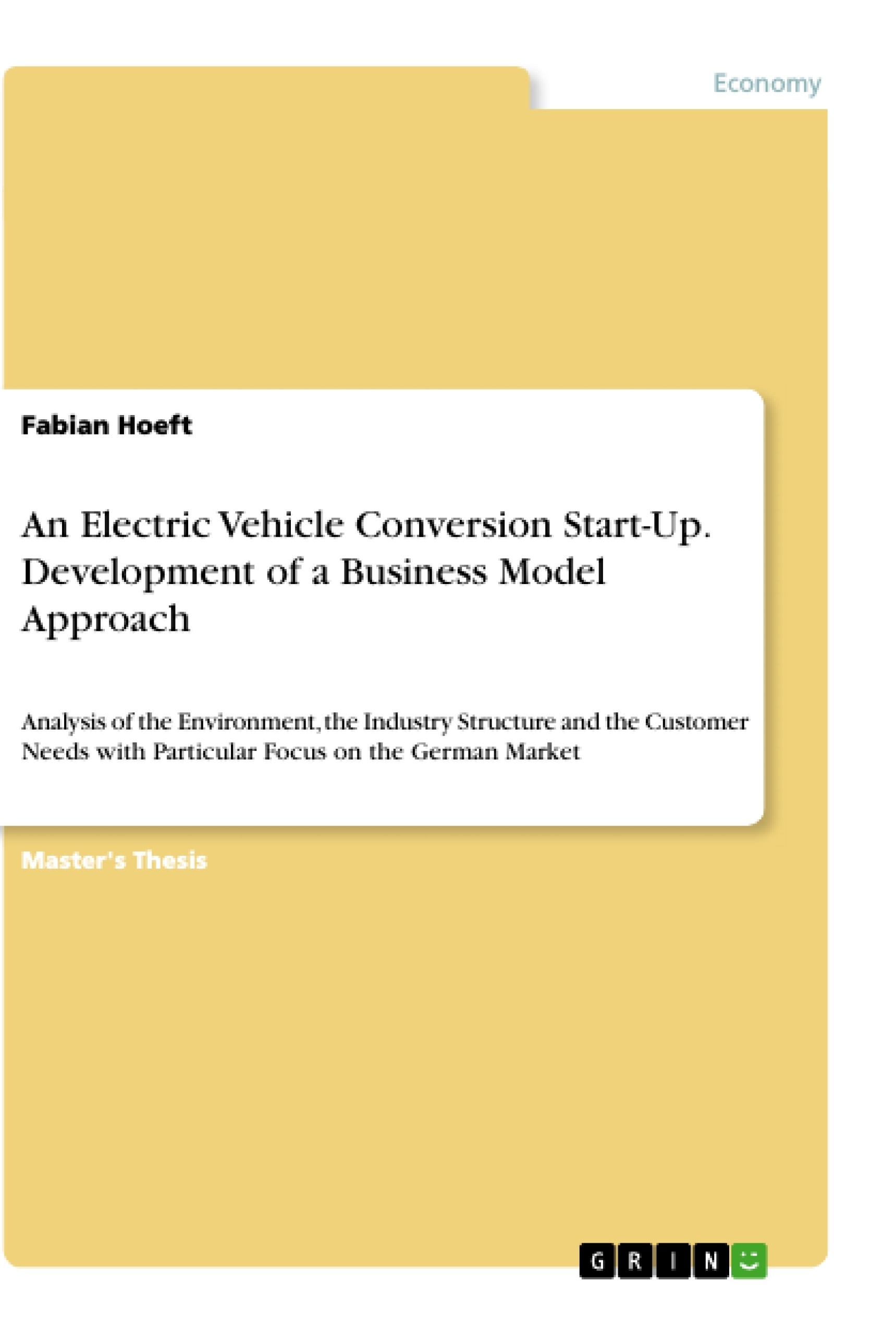Today's world of mobility is characterised by a high degree of dynamism and change is becoming apparent. Currently, around 45 million passenger cars with conventional combustion engines, powered by diesel or petrol, are registered in Germany. The share of electric vehicles is still well below one per cent. Nevertheless, the voices for sustainable and environmentally friendly transport are becoming louder. One political measure in this respect is the implementation of driving bans in major German cities for some conventional combustion cars.
Car electrification is a solution for converting cars with conventional combustion engines to electric drives. In the context of this thesis, car electrification is regarded as a transition solution towards a nationwide electrified transport network of new electric cars. A comprehensive concept of a business model approach from a start-up perspective has been developed based on the analysis of the environment, industry, and customer needs. Analysing the structure of the electrical conversion industry revealed that the subject of car electrification is hardly widespread and that current suppliers have only converted a smaller number of cars. Besides the small scale of implementation, the operational execution by existing suppliers can be considered weak in terms of competitiveness and sustainability.
The analysis of the needs of potential customers of car electrification using qualitative and quantitative methods has led to incredibly valuable insights for the development of the business model approach. A high openness to purchase was expressed, considering some of the factors mentioned, such as a test drive with an electrified car before purchase and a durability guarantee of the conversion. The high relevance of initial acquisition costs compared to operating expenses in the purchase decision for passenger cars is another precious insight. The business model approach developed based on the findings obtained differs fundamentally from the strategies of today's providers. By incorporating the existing infrastructure of workshops and service points, proximity to the end customer and scalability of the business operation can be achieved. Partnering with universities and industry are two critical elements in the development of a sustainable, secure, and user-friendly technical solution.
Inhaltsverzeichnis (Table of Contents)
- 'HVFULSWLRQRIWKHSUREOHP
- 5HOHYDQFHDQGREᆝHFWLYHVRIWKHUHVHDUFK
- 7KHVLVVWUXFWXUHDQGRYHUYLHZRIUHVHDUFKPHWKRGRORJ\
- 7KHRUHWLFDOIRXQGDWLRQVRIWKHVWUDWHᆢLFPDQDᆢHPHQWRIDQHZEXVLQHVV LQWKHILHOGRISDVVHQᆢHUFDUHOHFWULILFDWLRQ
- 7HFKQLFDOGHVFULSWLRQRISDVVHQJHUFDUHOHFWULILFDWLRQ
- 5HOHYDQWIRXQGDWLRQVRIVWUDWHJLFDQDO\VLV
- 6WUDWHJLFDQDO\VLVZLWKLQWKHVWUDWHJLFPDQDJHPHQWSURFHVV
- (QYLURQPHQWDODQDO\VLVXVLQJ3(67(/
- ,QYHVWLJDWLRQRIFXVWRPHUQHHGVWKURXJKᆞXDOLWDWLYHDQGᆞXDQWLWDWLYH PDUNHWUHVHDUFK
- ,QWURGXFWLRQWRWKH%XVLQHVV0RGHO&DQYDV
- 6WUDWHᆢLFDQDO\VLVRIWKHSDVVHQᆢHUFDUHOHFWULILFDWLRQEXVLQHVV
- 3(67(/HQYLURQPHQWDODQDO\VLV
- 3ROLWLFDOIDFWRUV
- (FRQRPLFIDFWRUV
- 6RFLDOIDFWRUV
- 7HFKQRORJLFDOIDFWRUV
- (FRORJLFDOIDFWRUV
- /HJDOIDFWRUV
- ,VVXHᆘ,PSDFWᆘ0DWULᆟ
- ,QGXVWU\ULYDOU\
- %DUJDLQLQJSRZHURIVXSSOLHUV
- %DUJDLQLQJSRZHU RIFXVWRPHUV
- 7KUHDWRIQHZHQWU\
- 7KUHDWRIVXEVWLWXWLRQ
- (PSLULFDOLQYHVWLJDWLRQ $QDO\VLVRIFXVWRPHUQHHGV
- ᆛXDOLWDWLYHSUHOLPLQDU\VWXG\
- 5HVHDUFKREᆝHFWLYHVDQGNH\ᆞXHVWLRQV
- 6HOHFWLRQRIWKHW\SHRILQWHUYLHZ
- 'HWHUPLQDWLRQRIWKHᆞXRWDDUUDQJHPHQW
- 3UHVHQWDWLRQRIWKHHᆟDPLQDWLRQGHVLJQ
- 'HYHORSPHQWRIDWKHPDWLFJXLGHIRUWKHVWXG\
- 2XWOLQHRIWKHSURFHGXUHIRUHYDOXDWLQJWKHLQᆘGHSWKLQWHUYLHZV
- 3UHVHQWDWLRQDQGLQWHUSUHWDWLRQRIWKHUHVXOWV
- ᆛXDQWLWDWLYHDQDO\VLV
- 5HVHDUFKREᆝHFWLYHVDQGUHVHDUFKK\SRWKHVHV
- 6XUYH\W\SHVHOHFWLRQDQGSUHVHQWDWLRQRIWKHUHVHDUFKVHWWLQJ
- 6DPSOHVHOHFWLRQDQGSRSXODWLRQGHILQLWLRQ
- (VWLPDWLRQRIWKHQHFHVVDU\VDPSOHVLᆲH
- 'HYHORSPHQWRIWKHVXUYH\LQVWUXPHQW
- 3UHVHQWDWLRQDQGLQWHUSUHWDWLRQRIWKHUHVXOWV
- 'HULYDWLRQRIDEXVLQHVVPRGHODSSURDFK
- &RQVROLGDWLRQRIWKHXQGHUO\LQJSUREOHPV
- &XVWRPHUVHJPHQWV
- 9DOXHSURSRVLWLRQ
- 'LVWULEXWLRQDQGFRPPXQLFDWLRQFKDQQHOV
- &XVWRPHUUHODWLRQ
- 5HYHQXHVWUHDPV
- .H\UHVRXUFHV
- .H\DFWLYLWLHV
- .H\SDUWQHUV
- &RVWVWUXFWXUH
- 5HYLHZDQGRXWORRN
- 6XPPDU\RIILQGLQJV
- &ULWLFDOUHIOHFWLRQRIWKHFKRVHQDSSURDFKDQGHODERUDWLRQ
- 2XWORRNRQWKHEXVLQHVVPRGHODSSURDFK
- %LEOLRᆢUDSK\
- /LVWRILQWHUQHWVRXUFHV
- $SSHQGLᆣ
- /LVWRI$EEUHYLDWLRQV
- /LVWRI)LᆢXUHV
- /LVWRI7DEOHV
- ᆙ,QWURGXFWLRQ
Zielsetzung und Themenschwerpunkte (Objectives and Key Themes)
The aim of this work is to investigate the impact of the transition to electromobility on the key themes of sustainability, innovation, and the automotive industry. It explores the role of different actors, including consumers, manufacturers, and policymakers, in shaping this transition and its implications for the future of transportation.
- The environmental impact of electromobility and its potential contribution to sustainability.
- The role of innovation in driving the development and adoption of electric vehicles.
- The challenges and opportunities for the automotive industry in the transition to electromobility.
- The influence of consumer preferences and behavior on the pace of electromobility adoption.
- The role of government policies and regulations in facilitating electromobility.
Zusammenfassung der Kapitel (Chapter Summaries)
The first chapter focuses on the current state of the automotive industry and the challenges it faces in the context of global climate change and the need for sustainable transportation solutions. The second chapter explores the technology and development of electric vehicles, including battery technology, charging infrastructure, and the economics of electromobility. The third chapter examines the role of consumers in driving the adoption of electric vehicles, including consumer preferences, attitudes towards electric vehicles, and the factors that influence their purchase decisions. The fourth chapter discusses the challenges and opportunities for the automotive industry in the transition to electromobility, including the impact on traditional business models, the need for new skills and technologies, and the potential for disruption from new market entrants. The fifth chapter analyzes the role of government policies and regulations in facilitating electromobility, including incentives for electric vehicle purchase, regulations for charging infrastructure, and the potential for new policies to accelerate the transition.
Schlüsselwörter (Keywords)
The main keywords and focus topics of the work include electromobility, sustainability, electric vehicles, battery technology, charging infrastructure, consumer behavior, automotive industry, business models, innovation, disruption, government policy, regulations, incentives, and the future of transportation.
Frequently Asked Questions
What is the goal of an Electric Vehicle (EV) conversion start-up?
The goal is to develop a sustainable business model for converting existing internal combustion engine cars into electric vehicles as a transition solution.
Why is car electrification considered a transition solution?
It utilizes the existing fleet of 45 million conventional cars in Germany while the infrastructure for new EVs is still being built up.
What are the main concerns of potential customers regarding EV conversion?
Customers prioritize initial acquisition costs, durability guarantees, and the possibility of a test drive before making a purchase decision.
How does the proposed business model differ from current providers?
It focuses on scalability by partnering with existing workshops and universities to ensure technical safety and customer proximity.
What tools were used to analyze the industry environment?
The research utilized PESTEL analysis, Porter's Five Forces, and the Business Model Canvas to structure the start-up approach.
- Quote paper
- Fabian Hoeft (Author), 2019, An Electric Vehicle Conversion Start-Up. Development of a Business Model Approach, Munich, GRIN Verlag, https://www.grin.com/document/502124



